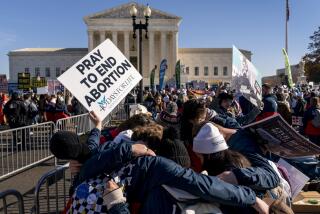History Preempts Bush Doctrine
- Share via
The Bush doctrine, unveiled by the president in his National Security Strategy paper in the wake of the World Trade Center attacks, called for preemptive military action against “emerging threats before they are fully formed.” One year later, President Bush put that controversial doctrine into effect in Iraq.
But despite all the noise and fanfare surrounding his embrace of preemptive war, this debate is not a new one. Since the founding of the nation, American leaders have grappled with the question of how to deal with emerging threats before they become immediate dangers. In virtually every case, our leaders have come down against the policy of preemption.
For the record:
12:00 a.m. March 10, 2004 For The Record
Los Angeles Times Wednesday March 10, 2004 Home Edition California Part B Page 13 Editorial Pages Desk 1 inches; 39 words Type of Material: Correction
War of 1812 -- A Sunday Commentary article on preemptive war said Andrew Jackson’s invasion of Florida in 1818 came six years after the British burned Washington, D.C. It came four years after the British burned Washington in 1814.
One of the first occasions was in 1818, when Gen. Andrew Jackson invaded Florida, then held by weak Spanish authorities. Jackson’s goal was to subdue marauding Native Americans and escaped slaves -- but above all, to take control of the British adventurers who had based themselves there. Only six years earlier, the British had burned Washington during the War of 1812, and now Jackson feared that without preemptive action in Florida the British would again endanger the U.S.
But Jackson’s invasion exceeded his authority, and he was unable to win support from his superiors. Writing to President James Monroe, Jackson pointed out that seizing east Florida “saves America from a war with Great Britain, or some Continental Powers combined with Spain.” But Monroe denied he had ever given Jackson approval for a preemptive strike. All members of the Cabinet -- except Secretary of State John Quincy Adams, who said the campaign was “justified by the necessity of the case” -- agreed that Jackson was out of line.
In 1842, the British threat, this time to California, again raised the issue of preemptive war. That year, the frigate United States set sail from Peru to California with two other sloops of war after Commodore Thomas ap Catesby Jones received information that Mexico and the U.S. were at war, and that the British were about to seize California. Landing in Monterey, Commodore Jones received the surrender of the Spanish officers and took California. But when he discovered that there had been no British invasion and no armed conflict with Mexico, he promptly withdrew.
With the coming of the Cold War in the 20th century, there was a great temptation toward preemption -- particularly in the early 1950s, when the Soviet Union had just tested its first atom bomb but America still possessed a massive lead in atomic weaponry. Many in the press and in Congress called for the United States to launch a preemptive strike against the Soviet bomb installations. But President Truman decided against it, and his secretary of State, Dean Acheson, spoke out forcefully in 1950 against the notion of unprovoked military action against Russia.
As time passed and the Soviets amassed more nuclear weapons and the missiles with which to deliver them, deterrence became the policy of both superpowers. Deterrence theory -- the theory of mutually assured destruction -- was the exact opposite of preemption. It was based on the notion that neither superpower would dare launch a first strike because each knew that the other would launch a devastating counterattack.
Nevertheless, in 1962, during the Cuban Missile Crisis, the White House seriously contemplated launching a preemptive strike against Cuba to rid the island of Soviet missiles and their nuclear warheads. But at a critical moment, while President John F. Kennedy listened to arguments in favor of an airstrike, Atty. Gen. Robert Kennedy passed him a note warning him that such a strike would be similar to the Japanese attack on Pearl Harbor. President Kennedy ultimately chose a more nuanced policy: a naval “quarantine” of Cuba, a blockade (also regarded as an act of war under international law).
Today our war is against terrorists and those who harbor them, and for the moment, the United States has the ability to do pretty much as it wishes militarily. The Bush version of preemption -- using force against emerging threats before they become imminent -- may well become America’s central military doctrine.
This would represent a fundamental departure from American traditions, contravening the long-standing assumption that a threat must be clear-cut and imminent before we take action (not an easy task given the state of our intelligence).
The radical new policy would call upon the United States to suppress political threats anywhere in the world. In a grotesque parody of the Monroe Doctrine, it could exclude countries not merely from having a say in the affairs of the Western Hemisphere but from having a say in the affairs of the parts of world in which they, too, live.
The inevitable response from the other nations of the world would be to combine against us. Not only our enemies but even our sometime allies would view the United States as a pariah nation -- to be feared, to be isolated and to be contained.
James Chace teaches international relations at Bard College. His newest book, “1912: Wilson, Roosevelt, Taft and Debs -- The Election That Changed the Country,” is due out in May.
More to Read
Sign up for Essential California
The most important California stories and recommendations in your inbox every morning.
You may occasionally receive promotional content from the Los Angeles Times.













